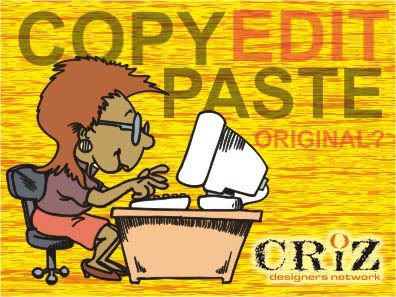Have you ever being accused of involving in plagiarism? How would you feel if you have no intention of doing so due to overseeing the must to quote or someone else has plagiarized your works as their own and you get wrongly accused for it? There are times when you comment or write something online, you would like to remain anonymous. The risk of doing so will eventually get your posting being plagiarized. So, how sure are you that you are 100% plagiarize free? Let us look at some of the researches that I have done through the internet and how I am going to quote to avoid being wrongly accused in the world of blogging.
There is a website that specializes in plagiarism. Visit plagiarism.org for more information you need to know on plagiarism. According to them, “Changing the words of an original source is not sufficient to prevent plagiarism. If you have retained the essential idea of an original source, and have not cited it, then no matter how drastically you may have altered its context or presentation, you have still plagiarized.”
There are 3 types of bloggers in the blogosphere:
AUTHENTIC BLOGGERS: Those who write from their experiences and happenings in their lives and in their own styles.
PARAPHRASE BLOGGERS: Those who write by paraphrasing other people’s work but proper credit are given to the original writer. These bloggers usually cover topic such as technical, computer, money making, scientific research, etc.
PLAGIARIZE BLOGGERS: Those who copy or borrow other people’s works as their own.
Let us understand further what Merriam Webster Online Dictionary has to say about these 3 types of bloggers.
AUTHENTIC: not false or imitation; true to one's own personality, spirit, or character.
PARAPHRASE: a restatement of a text, passage, or work giving the meaning in another form; the use or process of paraphrasing in studying or teaching composition.
PLAGIARIZE: to steal and pass off (the ideas or words of another) as one's own; use (another's production) without crediting the source; to commit literary theft; present as new and original an idea or product derived from an existing source.
Types of plagiarism
Learning to recognize the various forms of plagiarism, especially the more ambiguous ones, is an important step towards effective prevention. Many people think of plagiarism as copying another's work, or borrowing someone else's original ideas. But terms like "copying" and "borrowing" can disguise the seriousness of the offense. Let us look at some of the terms given below.
Sources Not Cited
"The Ghost Writer"
The writer turns in another's work, word-for-word, as his or her own.
"The Photocopy"
The writer copies significant portions of text straight from a single source, without alteration.
"The Potluck Paper"
The writer tries to disguise plagiarism by copying from several different sources, tweaking the sentences to make them fit together while retaining most of the original phrasing.
"The Poor Disguise"
Although the writer has retained the essential content of the source, he or she has altered the paper's appearance slightly by changing key words and phrases.
"The Labor of Laziness"
The writer takes the time to paraphrase most of the paper from other sources and make it all fit together, instead of spending the same effort on original work.
"The Self-Stealer"
The writer "borrows" generously from his or her previous work, violating policies concerning the expectation of originality.
Sources Cited (but still plagiarized)
"The Forgotten Footnote"
The writer mentions an author's name for a source, but neglects to include specific information on the location of the material referenced. This often masks other forms of plagiarism by obscuring source locations.
"The Misinformer"
The writer provides inaccurate information regarding the sources, making it impossible to find them.
"The Too-Perfect Paraphrase"
The writer properly cites a source, but neglects to put in quotation marks text that has been copied word-for-word, or close to it. Although attributing the basic ideas to the source, the writer is falsely claiming original presentation and interpretation of the information.
"The Resourceful Citer"
The writer properly cites all sources, paraphrasing and using quotations appropriately. What is the catch? The paper contains almost no original work! It is sometimes difficult to spot this form of plagiarism because it looks like any other well-researched document.
"The Perfect Crime"
Well, we all know it doesn't exist. In this case, the writer properly quotes and cites sources in some places, but goes on to paraphrase other arguments from those sources without citation. This way, the writer tries to pass off the paraphrased material as his or her own analysis of the cited material.
HOW TO AVOID PLAGIARISM?
Most cases of plagiarism can be avoided, however, by citing sources. Simply acknowledging that certain material has been borrowed, and providing your audience with the information necessary to find that source, is usually enough to prevent plagiarism.
SOME FREQUENT ASKED QUESTIONS (FAQ)
If I write something somebody else already wrote, but I didn't know they wrote it, is that still plagiarism?
While it is possible that you might write on the same topic as someone else, odds are that you will not have exactly the same ideas or express them in exactly the same way. It is highly unlikely that you would be accused of plagiarizing a source you have never read. Be careful, however, of "accidentally" plagiarizing from sources you have read and forgotten. If your ideas turn out to have been influenced by a source that you read but failed to cite for any reason, you could be guilty of plagiarism.
If I cite the source, can I still be accused of plagiarism?
You are allowed to borrow ideas or phrases from other sources provided you cite them properly and your usage is consistent with the guidelines set by fair use laws. As a rule, however, you should be careful about borrowing too liberally. If the case can be made that your work consists predominantly of someone else's words or ideas, you may still be susceptible to charges of plagiarism. Also, if you follow the words of a source too closely, and do not use quotation marks, it can be considered plagiarism even if you cite the source.
Reference: plagiarism.org
After reading everything I have “written” up there, do you feel that I’m plagiarizing? For your information, 80% are “copy & paste”, 10% are “altered”, and the balance is “original”. So how would you rate yourself?




















15 comments:
i damn hate hate them who 100 or 90% copy and paste other people post without even want to rephrase the words. Even is they darn lazy to think, they should at least change a little bit..
Hmmm~ I don't think I've plagiarised anyone's work before. At least not intentionally.
yes, agree with aaron chua. :)
if content copied without linking back the source.... thats not good. The best is email the owner before posting.
Now, its different with sponsored / paid posting. sometimes, the advertisers wanted you to include or use their content freely. The term freely is really freely. :)
as in your previous post, never ASS-U-Me others do any plagiarism. If he or she your friend, help them to realize it... do it at the background if can.
about your last sentence, well, only you can answer that for us. Are you, my friend? :D
we all do it, sometimes i do also when i'm blank & lazy! :P
Cikgu Criz is lecturing again. :-)
Good post. Keep up the good work.
dun let the lecturers read this la..from now on all the students gonna fail badly wahahah!..but i smart i always edit kao kao..front to end or end to front..
wahaha plagiarism, though from the explanation given, seems like we're left with not many topics to write about, since anything we write will more or less contain similar ideas with someone else's work.
We are all ex-plagiarist. We tend to "copy and paste" our text book text to our exam paper! Teacher should be punished because they teaches use to be the real artist of plagiarist! hahaha :D
ops.. typos there! hehehe
this thesis-long entry of yours is so thesis-long, and there can only be one reason for this.
somebody plagiarized your work? :D
babyfiona: it always happen and they really cut and paste with some changes.
aaron & jenny: wah...you two really think alike? hmmmm...plagiarizing each other? haha...just joking :)
papajoneh: i always do advise my friends in an indirect way. Some people can't take constructive criticism.
wuching: haha..glad you admit. just don't get bombarded for not giving proper links :P
kuanhoong: i sit horse. i don't sit bull. hmmmm...maybe i write an article for you next :P
joe: oopsss...hiding this after a week...lol
seraphangel: well...depends on how you link properly. Anyway, thanks for coming. What's your real name by the way, i need to add in my blogroll :)
ken xu: wah...like that also can. What i know nowadays some colleges has open book exams. Don't you think they are teaching students how to plagiarize? :P
wan yean: hey wanster...nice seeing you here. The answer is yes. From overseas some more...it's from a red hair monkey (hokkien)years ago and i got to know it few days ago...haha
thanks for this post!
Cikgu,
Good lecture.
What you brought up brought me back to a real incidence that I encountered yrs back.
I used to hire lectures who graduated from oversea and local.
One day 2 lecturers knocked on my door to ask me to help them to resolve a big issue that both of them have.
One of the lecturer graduated from Sunway then Michigan U. She was very upset that her student memorized every bit from the text book and reproduce every word the text book.
The student was also a part time lecturer (she was doing her advance diploma while teaching Microsoft package in my school).
The student who is also a part time lecturer did not see why the teacher and also coworker who gave her 0/100 for her work.
I wanted to laugh when they present their case to me.
Deep in my heart, I wonder is the differences due to these 2 people were educated differently ?
Why the lecturer who was educated in US felt so strongly that it is absolutely no ok to just copy everything from the textbook where the other who is being educated locally did not see why her lecturer made such a big fuss over such a issue. To her, she got 100/100 cos she remembered everything and reproduced every thing.
Well, how I solve this problem with be written in my blog.
I am too proud to copy people work :):). I don't even like designer shoe, bag or shirt. I like my own design. Ha ha ha ha ha.
copy is still copy la plagiarism is just a better word for it..
everybody does it intentionally or unintentionally
u just have to do it smartly
Post a Comment